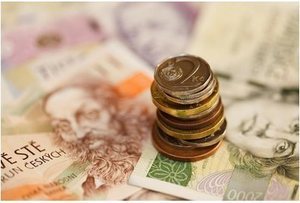Why did the exchange rate Euro-Czech Crown drop all of a sudden?
By Jean Baptiste Di Raffaele, www.diraffaele-accounting.com
July 29th, 2017
Let’s understand what happened three months ago when the exchange rate started abruptly to drop down. The following chart can be taken de facto in order to remember:

Source of the chart.
From the above illustration, two stages are observed:
- Before April 2017: the Czech Crown has a stable rate of 27 Crown per Euro.
- From April 2017: the exchange rate started to vary. As of today, the rate is about 26 Crown for a single Euro.
Martin, IT specialist reacted: “… I was told that the exchange rate is quoted in the Stock Exchange Market. So there is no way it is not supposed to have a constant rate over the time. Am I get it wrong?”
He got it right.
The FOREX (The Foreign Exchange Market) is in line with the Stock Exchange Market rules, usually see flexible fluctuations. We trade currencies. See the example:
A rich group of people buys 5% of all available crown currency volume in the foreign exchange market. By definition, this will increase the demand or create a shortage in its supply and then will grow the price per unit!
Now imagine you join your best friend and decide to buy a last-minute flight ticket. The demand will be very high because there will be only a few tickets remaining. The last tickets becoming rare, airline companies will likely to increase the price, allowing less people to buy it.

How the exchange rate drop became possible?
The Czech National Bank decided to use the exchange rate as a monetary policy instrument. Their role is to stabilize the money value in order to prevent deflation and to stay to the 2% inflation objective wanted by the directive of Czechia.
But, on April 6th, the CNB decided to trust the Czech Crown and released control of the peg, which was first introduced in 2013. So the foreign exchange rate fluctuated up and down once again.
This answers the fluctuation, what about the fast decrease?
The hold for 4 years may be a trigger. Nowadays, the exchange rate is worth one point below its initial stage on April 6th. That is to say a 3,7% decrease of the Euro value versus the Czech Crown in only 3 months. Here are the reasons:
€ The lowest unemployment rate in Europe: about 4,1% in Czechia in July. In reality, almost everyone is employed when the rate is around 5%, this because of the job turnover. Consequently, a Czech salary rises by 2.8 per cent in average year after year for the past 5 years. That's a sign the Czech economy grow stronger, is a trustful market and a land of opportunities.
€ Its connection to the western Europe: on top of his geographical and infrastructure benefit, Germany and Austria found attractive to outsource and invest in the national land. The attractive taxation rate (respectively 22,8% and 25% compared to 19% in Czechia) and the low cost of payroll are advantageous. In average 1 employee will cost to the employer in total: respectively €4583 and €3196 while only €1320 in Czechia. To know more about outsourcing in Czechia.
€ A great competitiveness in 2016: 13th most competitive economy in EU make investors and entrepreneurs confident in landing money. Czechia notably did the best result into the Visegrad group with an index of 4,7 ( 7 is the maximum). First is Switzerland with 5,8. To know more about the GCI (Global competitiveness Index).
To conclude, the drop reflects the economic growth pressure discharged by the Czech government. Thankfully, Czechia was and still is a promising land. The foreign exchange was actually … not sleeping!
Sources:

